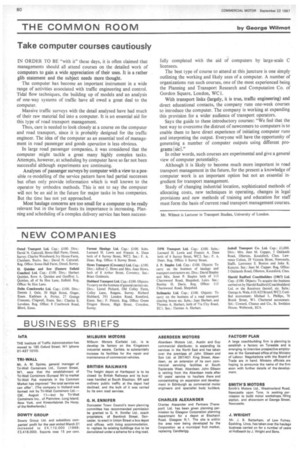Take computer courses cautiously
Page 82

If you've noticed an error in this article please click here to report it so we can fix it.
IN ORDER TO BE "with it" these days, it is often claimed that managements should all attend courses on the detailed work of computers to gain a wide appreciation of their uses. It is a rather glib statement and the subject needs more thought.
The computer has become an important instrument in a wide range of activities associated with traffic engineering and control. Tidal flow techniques, the building up of models and an analysis of one-way systems of traffic have all owed a great deal to the computer.
Massive traffic surveys with the detail analysed have had much of their raw material fed into a computer. It is an essential aid for this type of road transport management.
Thus, care is needed to look closely at a course on the computer and road transport, since it is probably designed for the traffic engineer. The idea of the computer as an essential tool of management in road passenger and goods operation is less obvious.
In large road passenger companies, it was considered that the computer might tackle a great many highly complex tasks. Attempts, however, at scheduling by computer have so far not been successful although experiments are continuing.
Analyses of passenger surveys by computer with a view to a possible re-modelling of the service pattern have had partial successes but often only provide information which is well known to the operator by orthodox methods. This is not to say the computer will not be an aid in the future for major tasks in bus companies. But the time has not yet approached.
Most haulage concerns are too small for a computer to be really relevant but in the larger fleets its importance is increasing. Planning and scheduling of a complex delivery service has been success fully completed with the aid of computers by large-scale C licensees.
The best type of course to attend at this juncture is one simply outlining the working and likely uses of a computer. A number of organizations run such courses, one of the most experienced being the Planning and Transport Research and Computation Co. of Gordon Square, London, WC I.
With transport links (largely, it is true, traffic engineering) and direct educational contacts, the company runs one-week courses to introduce the computer. The company is working at expanding this provision for a wider audience of transport operators. Says the guide to these introductory courses: "We feel that the best way to overcome the distrust of newcomers to computers is to enable them to have direct experience of initiating computer runs and interpreting the output. Everyone will have the opportunity of generating a number of computer outputs using different pro grams [sic]." In other words, such courses are experimental and give a general view of computer potentiality.
Although it is likely to become much more important in road transport management in the future, for the present a knowledge of computer work is an important option but not an essential ingredient for transport management.
Study of changing industrial location, sophisticated methods of allocating costs, new techniques in operating, changes in legal provisions and new methods of training and education for staff must form the basis of current road transport management courses.




























































































































